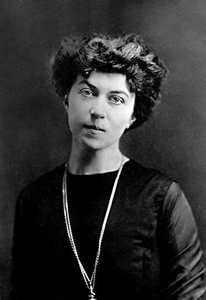Alexandra Kollontay
| Alexandra Kollontai | |
|---|---|

Alexandra Kollontai, circa 1900.
|
|
| Born |
Alexandra Mikhailovna Kollontai 31 March 1872 Saint Petersburg, Russian Empire |
| Died | 9 March 1952 (aged 79) Moscow, Russian SFSR, Soviet Union |
| Nationality | Russian |
| Occupation | writer, ambassador |
| Spouse(s) | Vladimir Ludvigovich Kollontai; Pavel Dybenko |
| Children | Mikhail Alekseevich Domontovich |
| Signature | |
 |
|
Alexandra Mikhailovna Kollontai (Russian: Алекса́ндра Миха́йловна Коллонта́й — née Domontovich, Домонто́вич; 31 March [O.S. 19 March] 1872 – 9 March 1952) was a Russian Communist revolutionary, first as a member of the Mensheviks, then from 1915 on as a Bolshevik. In 1923, Kollontai was appointed Soviet Ambassador to Norway, one of the first women to hold such a post.
Alexandra Mikhailovna Domontovich was born on 31 March [O.S. 19 March] 1872 in St. Petersburg. Her father, General Mikhail Alekseevich Domontovich, descended from a Ukrainian Cossack family that traced its ancestry back to the 13th century. He served as a cavalry officer in the Russo-Turkish War of 1877-78 and as an advisor to the Russian administration in Bulgaria after the war until 1879. He entertained liberal political views, favoring a constitutional monarchy like that of Great Britain, and in the 1880s had written a study of the Bulgarian war of independence which was confiscated by the Tsarist censors, presumably for showing insufficient Russian nationalist zeal. Alexandra's mother, Alexandra Androvna Masalina-Mravinskaya, the daughter of a Finnish peasant who had made a fortune selling wood, obtained a divorce from an unhappy arranged first marriage so that she could marry Domontovich, with whom she had fallen in love. Russian opera singer Yevgeniya Mravina (née Mravinskaya) was Kollontai's half-sister via her mother.
The saga of her parents' long and difficult struggle to be together in spite of the norms of society would color and inform Alexandra Kollontai's own views of relationships, sex, and marriage.
...
Wikipedia
